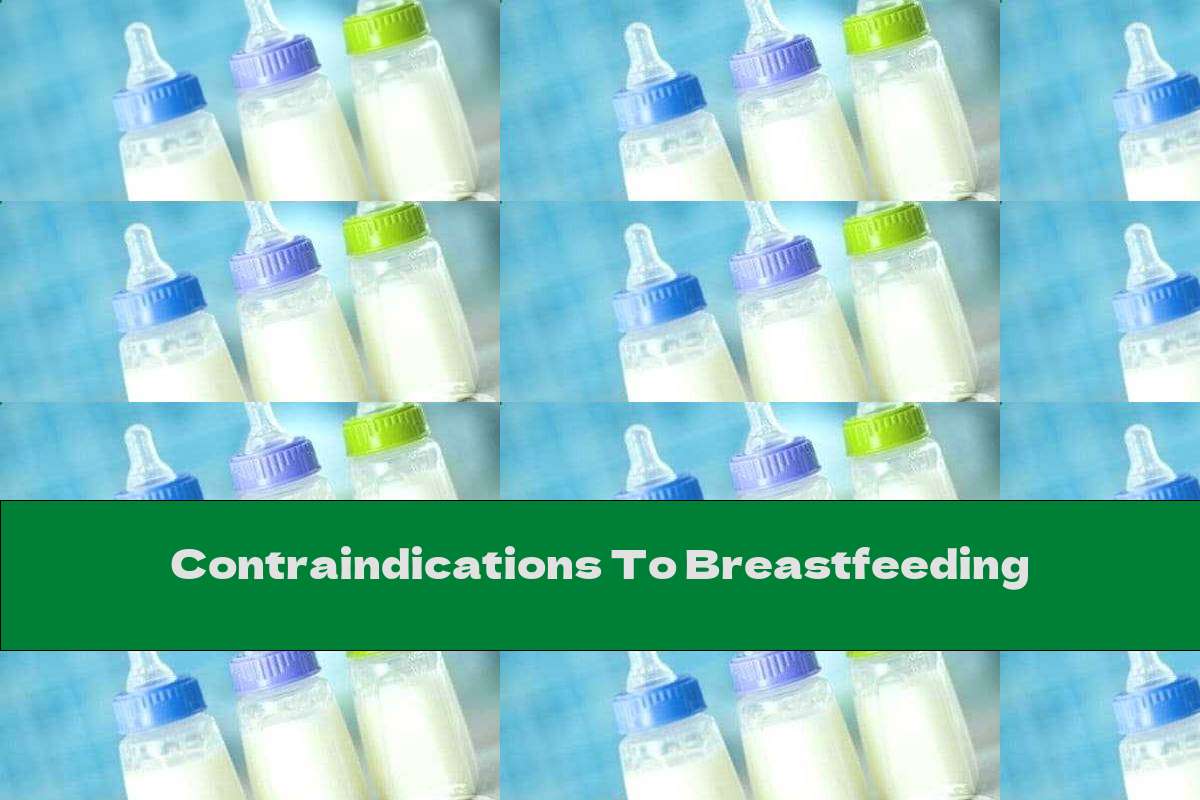Contraindications To Breastfeeding
 Author: Ivan Red Jr.
Time for reading: ~4
minutes
Last Updated:
August 08, 2022
Author: Ivan Red Jr.
Time for reading: ~4
minutes
Last Updated:
August 08, 2022

Although breast milk is the ideal baby food, it is sometimes necessary to temporarily or permanently stop breastfeeding. Contraindications to breastfeeding can be both on the mother's side and on the side
Everyone knows that breast milk is the best food for the baby! However, sometimes it is necessary to temporarily or permanently stop breastfeeding. The reasons for this can only be health problems on the part of the mother or the baby.
Many mothers have probably wondered if they can breastfeed their babies for colds, flu, gastrointestinal upsets, or other minor infections. The answer is: YES! Babies can be breastfed if you follow good hygiene and take appropriate precautions (mouth mask). In fact, during such infections, it is wiser to continue breastfeeding the baby, as with breast milk he will receive ready-made antibodies against the infection and this can prevent him from becoming infected with it.
There are times when breastfeeding should be stopped temporarily. In these cases, it is necessary for the mother to maintain the amount of breast milk by expressing it as often as she has breastfed the baby. The expressed milk is discarded!
If breast-feeding should be discontinued when the baby is less than two weeks old, the mother should express breast milk at least eight times a day, including at night. Even if the expressed amount of breast milk is in small quantities (between one teaspoon and one tablespoon), this should not discourage the mother. Milk production gradually increases during the first week, so it is necessary to express breast milk in time, not in quantity. The time should be between 10-15 minutes per breast at each session. The aim is to stimulate milk production.
Women should temporarily stop breast-feeding if:
- lesions associated with impetigo and herpes simplex appear on the breast - breastfeeding can be resumed only after the lesions have completely disappeared.
- have taken a single dose of radioactive compounds for diagnostic purposes - breastfeeding is resumed after the body is completely cleared of the compound.
- it is necessary to take certain medications for a short period of time - antihistamines (for the treatment of allergies), some antibiotics, diuretics, analgesics, anti-inflammatory, iodine products, lipid-lowering drugs and others. Be sure to consult your doctor if you need medication!
Any woman who needs to temporarily stop breastfeeding can seek help from a breastfeeding counselor or guidance from breastfeeding support groups. This would be helpful, as the baby may have difficulty sucking again. Breastfeeding counselors help with techniques that make the transition to breastfeeding easier for the baby.
There are conditions on the part of the mother in which breastfeeding is not recommended. These include:
- Maternal infection with HIV or AIDS. The HIV virus can be transmitted to a baby through breast milk. For this reason, it is not allowed if the mother is HIV positive or has AIDS. Women need to know their HIV status before deciding to breastfeed. These mothers can turn to breast milk banks if they want to use breast milk for their babies instead of formula.
- Cancer and maternal chemotherapy. Chemotherapy drugs make it difficult for cells to divide rapidly, and this can seriously impair a baby's growth. Cancers themselves are not contraindicated for breastfeeding.
- Radiation therapy, especially for the chest. Mothers undergoing this therapy should also not breast-feed until the treatment regimen has been completed.
- Untreated active tuberculosis. In this condition, mothers should not breast-feed their baby until the infection has healed.
- Infection with human T-cell lymphotropic virus type I or type II.
- Drug use - amphetamines, cocaine, heroin, marijuana, or phencyclidine. Mothers who use drugs should not breast-feed their babies, as these drugs can cause serious harm to the baby. A glass of alcohol can be consumed, provided that the mother does not breastfeed the baby for at least the next two hours. The best option is to completely stop smoking and alcohol by breastfeeding mothers.
- Cases in which the mother has to be prescribed medication for a long period of time. The attending physician should be informed that she is breast-feeding! Contraindicated during breastfeeding are - antidepressants, drugs for high blood pressure, antiretroviral drugs, mood stabilizers (lithium and lamotrigine), sleeping pills, estrogen-containing contraceptives, drugs for the treatment of migraine (ergot alkaloids).
Detailed information on the use of drugs during breastfeeding can be found in the topic: Medicines during breastfeeding.
There are also conditions on the part of the baby in which breastfeeding is not recommended:
- Galactosemia (an inherited disease that manifests itself in galactose intolerance - a sugar contained in breast milk). Babies with classic galactosemia should be fed a special diet that is free of lactose and galactose.
- Very rarely, a baby can be sensitized to allergens that enter it through milk. They often cause weaning. In such cases, it is necessary to detect the allergen in order to remove it from the mother's diet.
- How to feed a breastfeeding woman
- Diarrhea in breastfed babies
- How to eliminate nighttime breastfeeding
- Natural means of stopping breast milk
Related Articles
- Nutrition Guide: Breastfeeding for Infants and Mothers
- The Benefits of Night Breastfeeding for Nutrition: A Complete Guide
- The Importance of Night Breastfeeding for Nutrition: Benefits for Your Baby
- Night Breastfeeding for Nutrition: Benefits, Nutritional Composition, and Recipes
- The Ultimate Guide to Breastfeeding in Nutrition: Benefits, Diets, Concerns, and Recipes